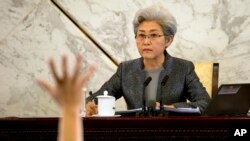China has responded to criticisms raised by U.S. President Barack Obama about regulations that could impact high-tech firms. The spokeswoman for China’s top legislative body says that companies doing business here have nothing to fear from a new anti-terror law that is under review.
According to the draft anti-terrorism law, high-tech firms operating in China would be required to hand over encryption keys and install backdoors to aid counterterrorism investigators in their work.
Obama warned in an interview with Reuters that Beijing would have to change those provisions requiring government access if Chinese companies wanted to do business in the United States.
Speaking at a news conference Wednesday, one day before China begins meetings of its National People’s Congress, parliamentary spokeswoman Fu Ying tried to reduce tensions over the increasingly heated debate. She said Chinese companies doing business in the U.S. were also subject to intense security checks, adding that Obama's concern about the legislation was a sign of progress showing the two sides were engaged on the issue.
Fu said the regulations in the law were set up in accordance with the principles of China’s administrative laws and in line with international practices. She said they would not affect the interests of Internet firms.
Back door access
China’s draft anti-terrorism law just passed its second reading and the legislation could be approved in the coming weeks or months.
But the provision requiring companies to provide back door access to government officials has raised alarms in the United States. Technology companies are already trying to reassure customers that their communications are secure, following revelations about the sophisticated surveillance tactics used by the National Security Agency.
Foreign business groups in China have voiced their deep concern with the regulations and are calling for more discussions with the government.
Kenneth Jarrett, president of the Shanghai Chapter of the American Chamber of Commerce, told Reuters that the Chinese draft law asked more of companies than they were likely to agree to.
"In general, any requests to provide source code, encryption keys and algorithms is something that an IT company would be very reluctant to do. I would say reluctant to do regardless of where they are operating,” he said.
Obama said this was an issue he and others in his administration have raised directly with China’s President Xi Jinping and Chinese authorities.
“Those kinds of restrictive practices I think would, ironically, hurt the Chinese economy over the long term because I don’t think there’s any U.S. or European firm, any international firm that can credibly get away with that wholesale turning over of data, personal data over to a government,” he said.
The draft anti-terrorism law is not the only regulation that Chinese authorities are currently considering that would require foreign companies hand over such information, opening them up to surveillance and forcing them to hand over sensitive intellectual property.
Firewall
In the wake of former NSA contractor Edward Snowden’s revelations about U.S. government spying capabilities, China has increasingly tightened its cybersecurity policies. Beijing already extensively polices its domestic internet, and uses a firewall to prevent Chinese internet users from accessing foreign news, social networks like Facebook, and websites that the authorities forbid.
China’s state-run Xinhua news agency did not mince words in a commentary on Obama’s reaction to the draft law. The editorial published Wednesday called Obama’s criticisms groundless and evidence of what it called the hypocrisy of U.S. policy.








